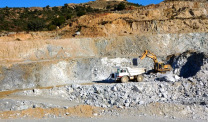Johnson & Johnson Targets Mesothelioma Expert Again
Legislation & LitigationWritten by Travis Rodgers | Edited by Walter Pacheco

Johnson & Johnson is trying a different strategy to discredit a reputable mesothelioma expert as asbestos claims against its talc products continue to climb.
The company reopened a lawsuit in the U.S. District Court for the District of New Jersey against Dr. Jacqueline Moline, an expert witness who has supported plaintiffs’ claims that J&J’s talc-contaminated products caused them mesothelioma and other asbestos-related conditions.
J&J accuses Moline of falsifying information in a study linking asbestos in talcum powder to mesothelioma. In 2020, Moline published the results of a study that evaluated 33 people who had used talcum powder before developing mesothelioma – an incurable asbestos-related cancer that takes 20-60 years for symptoms to appear.
Moline’s research showed the study’s participants had no other exposure to asbestos, which helped strengthen the hundreds of talc lawsuits against J&J that referenced her data in their plaintiffs’ legal claims.
However, in October 2024, the New York Supreme Court allowed Johnson & Johnson to review her research data, Johnson & Johnson officials now claim that at least half of the people in the study may have been exposed to asbestos in other ways such as through old insulation or cigarette filters. Because of this, J&J says Moline’s study is false and misleading.
Johnson & Johnson’s new attempt to discredit Moline follows the drugmaker’s 2023 lawsuit against her, which U.S. District Judge Georgette Castner, of the same New Jersey jurisdiction, dismissed in 2024.
J&J’s Failed Libel Lawsuit
J&J filed the first libel lawsuit against Moline in 2023. The drugmaker calls the science behind Moline’s research “junk” and says it creates a “false narrative” about Johnson & Johnson and its products. A U.S. district judge dismissed the lawsuit in July 2024.
A judge said Moline’s research paper didn’t engage in fraud, libel or false advertising. Instead, the judge noted that Moline presented her research as “tentative scientific conclusions, not unequivocal statements of fact.” Moline’s work was considered protected free speech.
Johnson & Johnson maintains its talcum powder and other talc products are safe and free of cancer risk. The company continues to defend itself in thousands of lawsuits.
J&J’s Ongoing Legal Struggles
In April 2025, a U.S. bankruptcy judge turned down J&J’s $10 billion plan to settle more than 60,000 lawsuits. People who say they got ovarian cancer from using the company’s talc-based products filed the lawsuits. This is the third time J&J has tried and failed to use bankruptcy to handle the cases.
If the Johnson & Johnson’s bankruptcy plan had been approved, it would have given each plaintiff $75,000 to $150,000 and would have resolved any future ovarian cancer lawsuits. The proposal didn’t include people with mesothelioma. J&J says most of those cases have already been settled. Now that the settlement plan has been denied, people with ovarian cancer will continue to take their cases to court, just as mesothelioma patients have.
J&J has spent about $1 billion defending itself in lawsuits stemming from its talc products. Court records show the company knew as early as the 1950s that its talc could contain asbestos. Lab tests found asbestos in J&J’s talc from 1971 through the early 2000s, but the company hid the results from the U.S. Food and Drug Administration. Talc and asbestos naturally form near each other in the ground, making it challenging to keep them completely separate. Asbestos is the primary cause of mesothelioma and can also lead to many other asbestos-related diseases. While J&J claims its baby powder is safe and doesn’t cause cancer, it removed the product from shelves worldwide in 2023 and now sells a cornstarch version instead.







